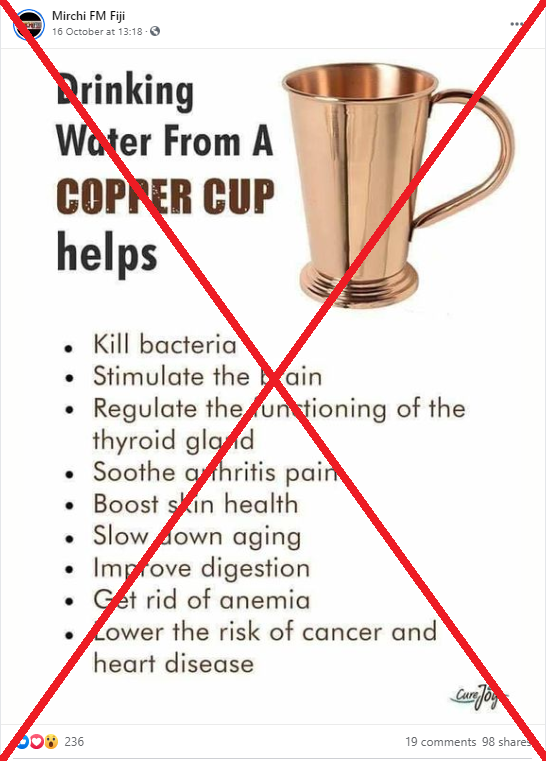
Experts say there is no evidence to support the claims
- This article is more than five years old.
- Published on October 30, 2020 at 08:15
- 4 min read
- By Taylor THOMPSON-FULLER, AFP New Zealand and Pacific Islands
The claims were shared by a Fijian-based Facebook page here.

The image shows what appears to be a copper cup besides the claim: “Drinking Water From A Copper Cup helps
“- Kill bacteria
- Stimulate the brain
- Regulate the functioning of the thyroid gland
- Soothe arthritis pain
- Boost skin health
- Slow down aging
- Improve digestion
- Get rid of anemia
- Lower the risk of cancer and heart disease”
The claims have also been shared thousands of times on Facebook here, here, here and here.
The claims, however, are false.
Copper, essential to human health
Copper is one of many essential nutrients that the body needs to function properly and is involved in many physiological processes, including “brain development, pigmentation, and immune system function,” according to the National Institute of Health (NIH).
Copper deficiency can lead to anemia, osteoporosis and bone defects. People diagnosed with celiac disease and menkes disease are more susceptible to the condition because their bodies aren’t able to process the mineral properly.
Too much copper, however, can also lead to health complications. Excess exposure to the mineral can lead to abdominal pain, nausea, diarrhea, and vomiting, according to the United States National Research Council.
Ayurveda, the alternative medical practice from the Indian subcontinent, recommends storing water in copper vessels and drinking from copper cups for purification of water.
Antimicrobial properties
University of Adelaide toxicologist Dr John Musgrave, however, told AFP in an interview while copper does have antimicrobial properties for waterborne pathogens, there needs to be enough copper ions in the water for the process to work and that takes time.
“If you just take a cup of water in a copper cup and start drinking it, it doesn’t have enough time to acquire enough copper ions. [The water] has to sit in the cup for a long period.
“Copper pots for storing water have been shown to kill bacteria, but again you have to leave it there for a while -- it’s not just whack it in a cup and drink it and it’s all fine.”
A 2012 study from the peer-reviewed Journal of Health, Population and Nutrition, showed that certain waterborne pathogens like Cholera couldn’t survive in copper pots after being stored in the vessels for 16 hours.
Soothing arthritis pain
Dr Musgrave also said the connection between copper and soothing arthritis pain “has been shown to be incorrect”.
“It’s been studied multiple times and copper has no benefit for arthritis,” he added.
Wearing copper wrist straps and bracelets are a popular remedy for soothing arthritis pain, but multiple peer-reviewed studies have found the practice has no therapeutic benefits.
This 2013 study from the peer-reviewed PLOS One journal found “wearing a magnetic wrist strap or a copper bracelet did not appear to have any meaningful therapeutic effect, beyond that of a placebo”.
A 2005 study from peer-reviewed Complementary Therapies in Medicine also showed “copper bracelets are generally ineffective for managing pain, stiffness and physical function in osteoarthritis”.
From reducing aging, to lowering the risk of cancer, what about the other claims?
Dr Ian Musgrave said there’s “no evidence” to support the claims that drinking from a copper cup can stimulate the brain, regulate the functioning of the thyroid gland, boost skin health, slow down aging, improve digestion, get rid of anemia or lower the risk of cancer and heart disease.
“Copper is vital to our biological systems… but if you are already replete in copper, adding more is not going to do anything. And you can get copper from far tastier sources than drinking water out of a copper cup,” Dr Musgrave said.
According to University of Otago's Associate Professor of Biochemistry Robin Fulton, while copper is involved in critical biological functions, the science shows that people don’t need copper supplements or to drink from copper cups to support those functions.
“Most people get enough copper through their diet. As long as there is no malnutrition, or a person has no risk factors that limit the absorption of nutrients in general, then the body is able to regulate the amount of copper it maintains,” Fulton explained in the October 29 email.
After similar claims about copper cups went viral in 2016, head of University of Pittsburgh Medical Centre’s Poison Centre, Dr Michael Lynch, echoed Musgraves statements that “there’s probably no real health benefit or risk from drinking from a copper cup”.
“Most of these cups are sealed on the inside, so there’s no real exposure to the copper,” he added.
Copyright © AFP 2017-2026. Any commercial use of this content requires a subscription. Click here to find out more.
Is there content that you would like AFP to fact-check? Get in touch.
Contact us
